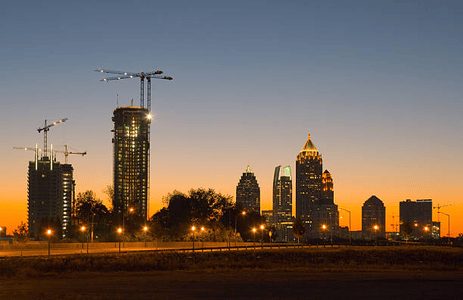New Construction Projects Highlight the Apartment Boom in Atlanta
In recent years, the Atlanta metropolitan region has been one of the most active rental markets in the United States, and it shows many signs that suggest growth may continue through the rest of the decade. The expansion of various business sectors has coincided with the strengthening of research institutions, thus attracting new residents who move from other regions of Georgia or from out of state.
According to a report published by the Midtown Alliance, a community group dedicated to the development of the commercial Midtown district, more than 2,000 apartments were added over the last 12 months. The units were spread across six major projects, including boutique condominiums such as Emmi, Hanover, Kinetic, and Momentum. In addition to these residential projects, developers also added 605,000 square feet of office space and 65,000 square feet for retail tenants.
The Midtown Alliance has been monitoring the socio-economic growth of the district since 2018; since then, more than 10,000 rental units have been added, and urban planners anticipate higher demand from residential and commercial tenants from now until 2030. At any given time, the multifamily construction pipeline in this district, which sits on 1.2 square miles, has more than a thousand units under development. The density of Midtown Atlanta has sharply increased over the last five years; however, thoughtful planning and a philosophy that prioritizes mixed-use development are helping to keep gridlock and overcrowding in check.
Many new residential units recently delivered in Midtown Atlanta are for student housing. The district has evolved into a prominent research center and a vibrant college town through the growth and expansion of institutions such as Georgia Tech and Emory University. These schools attract students, faculty, and researchers, creating a dense concentration of skilled individuals. Some graduate and research programs at Georgia Tech provide housing for students and their families, thus underscoring the need for more apartments. Since the end of the COVID-19 pandemic, the Emory University Hospital system has forged partnerships with major investors in the life sciences sector to develop new treatments, biomedical devices, and pharmaceuticals. Georgia Tech has enjoyed an even larger expansion of scientific research programs in the computer science, artificial intelligence, and sustainable energy fields.
The surge in student housing construction is set to reshape Midtown Atlanta, and this urban development trend is expected to benefit other districts. It is important to note that less than 15% of the rental units delivered in recent years are for student housing; the rest are for thousands of prospective tenants attracted by the Midtown lifestyle, which has become more pedestrian and convenient thanks to a smart approach to urban planning. Many graduate students and post-graduate researchers at Emory and Georgia Tech choose to stay in Midtown after completing their degree or investigative programs, so they transition from student housing to residential communities in the district.
Companies that rely on talent pools rich in skilled workers have been expanding their presence in Midtown. Internet giant Google operated a regional headquarters office from a small Midtown office until two years ago when it expanded to a new tower on West Peachtree Street, and now manages a local payroll of 1,000 employees. Visa is expected to move from Promenade Tower to a redeveloped tower at the 1200 Peachtree Center; this will create 700 new jobs. In press releases announcing the moves, executives from Google and Visa explained that choosing Midtown for their respective expansion was strongly motivated by the talent pool. Other companies that recently moved here include Exotec, a robotics firm focused on warehouse automation and infrastructure design giant HNTB.
Midtown is not the only Atlanta district that is getting new rental units. The regional rental market has gone through a period of adjustment that has improved housing affordability, thus prompting real estate investors and developers to launch new residential projects. According to projections by RentCafe and Zillow, Atlanta is ranked fifth in the U.S. in terms of new multifamily construction projects. Over the next 12 months, more than 12,000 new apartments, condos, studios, and townhomes will be added to the metropolitan region. The downtown districts are where most of the development will be concentrated; for example, the Centennial Yards mixed-use project across from Mercedes-Benz Stadium includes a 19-story tower with 304 condominium units and penthouses. There's also a high-rise tower under construction next to the fountain in the Underground Atlanta district, which will add 405 units, including 163 that will be designated for affordable housing.
Lower rents for residential tenants and higher demand for commercial spaces are factors driving the Atlanta rental market, which is getting an additional benefit from the labor market thanks to regional wage growth. The projected outlook of 12,000 new units in a year is sustainable; plus, the market is expected to reach a more balanced state with positive rent growth and improved occupancy rates. The absorption of new units will determine the pace of future construction.

